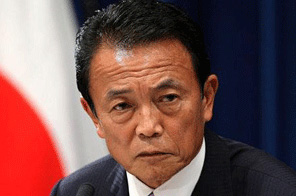Japan'sPM to call national election
TOKYO: Japan's embattled prime minister has decided to dissolve parliament and call general elections for next month, a news report said Monday, after his party was defeated in a Tokyo municipal poll considered a barometer of voter sentiment.
Broadcaster NHK and Kyodo News said Taro Aso would dissolve the powerful lower house of parliament next week, and that national elections would be held Aug. 30. Spokesmen at the Liberal Democratic Party headquarters and the prime minister's office said they had no knowledge of the matter.
Aso's Liberal Democratic Party and its coalition partner lost their majority Sunday in the Tokyo Metropolitan Assembly, the local parliament for the Japanese capital and most populated prefecture.
The Tokyo vote was closely watched as sign of how Aso's ruling party would fare against the main opposition Democratic Party of Japan in a general election, which must take place by October. In the Japanese political system the head of the party that has control of the national parliament generally becomes prime minister.
Aso has suffered low approval ratings as Japan's economy stumbles toward deflation and political wrangling has delayed the passing of legislation.
As prime minister he can call a general election at any time, but had apparently been waiting, gambling that his political situation could improve.
The dire results of the Tokyo election seemed to have forced his hand. An emboldened opposition could gain momentum and do further political damage. Kyodo News reported Monday that the Democrats would introduce a no-confidence resolution and censure motion in parliament against Aso.
Tokyo election results released early Monday morning by the parties showed the Liberal Democrats lost 10 seats in the Tokyo election, while its coalition partner, the New Komeito Party, gained just one, giving the coalition 61 seats — below the crucial 64 needed for a majority.
Prior to the election the Liberal Democrats held 48 seats and the New Komeito had 22, giving the coalition a comfortable majority.
The Democratic Party of Japan, which has longed clashed with Aso's Liberal Democrats on major issues, gained 20 seats, increasing its share to 54. Together, parties aligned against the Liberal Democrats now hold a slight a majority in Tokyo's local parliament.
"Voters are fed up with the Liberal Democratic Party. Its economic and social welfare policies are all deadlocked. Voters are hoping that the Democratic Party of Japan can bring change to Japanese politics," said Takayoshi Matsuo, emeritus professor of political science at Kyoto University.
In the run-up to the Tokyo poll, Aso's party has already lost four straight regional elections since April to the opposition party.
Since taking office in September last year, Aso has struggled to shore up sagging public support, which remains at 20 percent. The 68-year-old premier has been diminished by a string of political gaffes and weak leadership.
The public was also frustrated with Aso's handling of Japan's economy, which is mired in the worst recession since World War II.
He has become so unpopular that lawmakers in his own party have called for his removal before the election.
Newspaper opinion polls have already suggested the opposition party is well-placed to make major gains or even rise to power in the national election, with its leader Yukio Hatoyama likely to replace Aso.
That would mean the end of rule by the Liberal Democratic Party, which has governed Japan for all of the past 50 years except a brief period in 1993.
However, that would still require a sea change in voter support. The Liberal Democrats currently have 303 seats in the 480-seat lower house, and its partner Komeito has 31. The Democratic Party has just 112.
Hatoyama said Friday it was time for a new era in Japanese politics and that the country should be inspired by President Barack Obama's win in last year's elections in the United States, Japan's most important ally.
The opposition party has promised change in what it calls Japan's bureaucrat-led politics, improve welfare measures and lower the cost of education.






